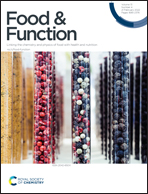Polysaccharide from Ganoderma lucidum alleviates cognitive impairment in a mouse model of chronic cerebral hypoperfusion by regulating CD4+CD25+Foxp3+ regulatory T cells†
Abstract
Ganoderma lucidum (G. lucidum) is a kind of edible and medicinal mushroom. G. lucidum polysaccharide-1 (GLP-1) is one of the polysaccharides purified from crude GLP. Chronic cerebral hypoperfusion (CCH) as the common pathological basis of various forms of dementia is an important cause of cognitive impairment. In this study, a step-down test was used to evaluate the cognitive ability of CCH mice. Flow cytometry was used to detect the proportion of CD4+CD25+Foxp3+ regulatory T (Foxp3+Treg) cells. ELISA analysis and western blot analysis were used to detect the transforming growth factor-β1 (TGF-β1) and Interleukin-10 (IL-10) levels that Foxp3+Treg cells secreted. Metabolomic analysis based on gas chromatography–mass spectrometry (GC–MS) was used to evaluate the effect of GLP-1 on dysfunctional metabolism caused by inflammation. Results indicate that GLP-1 exhibited an alleviating cognitive impairment effect on CCH mice. The mechanism was related to GLP-1 by increasing Foxp3+Treg cell levels to increase levels of IL-10 and TGF-β1 and regulate abnormal energy metabolism. These findings could provide preliminary results to exploit G. lucidum as a health care product or functional food for the adjuvant therapy of cognitive impairment of CCH.



 Please wait while we load your content...
Please wait while we load your content...